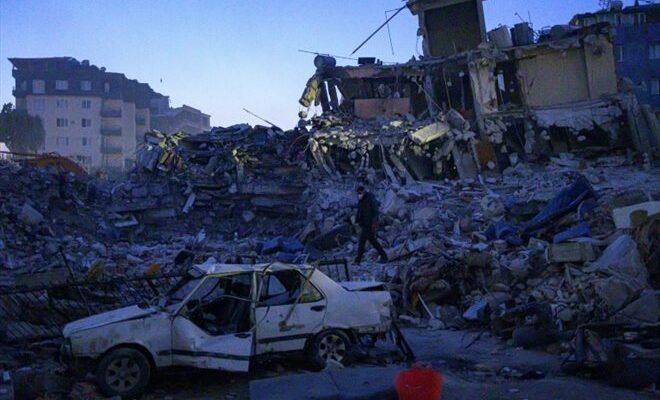Turkey must spend billions of dollars to rebuild its 11 provinces, despite the country running out of funds (AFP/Yasin AKGUL)
Turkey, which was counting on the generosity of a few wealthy partners to get back on its feet, must now bear the consequences of the February 6 earthquake which razed dozens of cities and left millions of people homeless and jobless.
It will now have to devote billions of dollars to the reconstruction of the eleven southern and southeastern provinces ravaged by the worst disaster in its contemporary history.
President Recep Tayyip Erdogan has also promised millions of Turkish liras to affected populations ahead of the presidential and legislative elections – still scheduled at this stage for May 14.
All that money could boost consumption and industrial production, two key indicators of economic growth. But Turkey is running out of funds.
The reserves of the central bank, practically reduced to nothing, have been able to be replenished thanks to the help of Russia and the oil states of the Gulf.
But economists say that money will be just enough to keep Turkey’s finances afloat and keep the struggling Turkish lira from collapsing – until May’s election if confirmed.
However, Mr. Erdogan must now repair some 78.9 billion euros in damage, according to the estimate of a group of leading business leaders. Estimates from other experts are more conservative, closer to $9.4 billion.
– Boost for reconstruction –
In anticipation of the elections, Erdogan has already promised to provide new housing within a year for the millions of people affected.
If he finds the money thanks to new payments from foreign donors, the head of state will have to allocate a large part of it to the building sector to rebuild whole sections of the country reduced to nothing.
The president has always relied on this sector, which has now been singled out and held responsible for the massive collapses of residential buildings for having cheated with anti-seismic standards. He was thus able to modernize a large part of the country, open airports, roads, hospitals.
“The reconstruction work could largely offset the negative impact (of the earthquake) on economic activity,” said the European Bank for Reconstruction and Development (EBRD).
Before the earthquake, the affected region contributed 9% of the gross domestic product (GDP) to the Turkish economy, in particular through important industrial zones in Gaziantep and the port of Iskenderun through which products from the region are conveyed to the world.
Agricultural production will also take the hit: according to Unay Tamgac, associate professor of economics at TOBB-ETU University in Ankara, the region provides 14.3% of Turkish agricultural production, including fishing and forestry.
The Food and Agriculture Organization of the United Nations (FAO) has warned of disruptions to staple food production in Turkey and Syria.
– Better than in 1999 –
The earthquake also affected the infrastructure of energy, transport, irrigation canals, continues Ms. Tamgac.
Some look back to try to find a model to follow.
Mahmoud Mohieldin, executive director of the International Monetary Fund (IMF), nevertheless estimated that this earthquake, with a magnitude of 7.8, would be less damaging to the economy than that of 1999 (7.6) which had 17,000 dead – the IMF was quick to point out that this official was speaking only in his own name.

Experts believe that this earthquake could be less damaging for the Turkish economy than that of 1999 which hit Istanbul (AFP/MANOOCHER DEGHATI)
The Turkish economy had lost 0.5 to 1.0% of GDP in 1999, but the earthquake then hit the industrial heart of the country, including its economic capital, Istanbul. However, it quickly rebounded and achieved 1.5% GDP growth the following year thanks to reconstruction efforts, according to the EBRD.
Tourism, “which has become one of Turkey’s main sources of foreign currency”, should be relatively spared, as the earthquake-hit region is not the first destination for foreign tourists, according to a note shared by Wolfango Piccoli, an analyst at the consulting firm Teneo.
– Headwinds –
“It is clear that there will be a need for foreign currencies”, insists on this subject Baki Demirel, associate professor of economics at the University of Yalova who notes that Turkey will have to import more.

A major business group estimates the total cost of quake damage to be $84.1 billion (AFP/Yasin AKGUL)
Fortunately, the country’s sovereign debt is relatively low, which leaves the government some leeway.
On the other hand, foreign investors are shying away from the country because of Mr. Erdogan’s highly unorthodox policies which have driven inflation soaring by steadily lowering interest rates.
When the disaster occurred, Turkey had just announced an official inflation rate of 58%, against more than 85% at the end of 2022.
But Turkey is subject to headwinds that risk blocking its growth in the coming year, experts agree.
© 2023 AFP
Did you like this article ? Share it with your friends with the buttons below.




